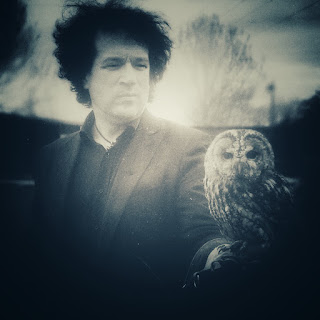I.
The first time I remember hearing that the Greeks had a word for it was when listening to the 1981 single 'Chihuahua' by Bow Wow Wow [1] and it always rather amused and intrigued me; I wondered where, for example, McLaren picked the expression up from.
One possible answer is that he knew of the raunchy play of this title, written by Zoe Akins, which opened on Broadway in September 1930. She is generally given credit for coining the phrase. [2]. Of course, I don't know if that's the case - I'm just surmising; maybe he knew the expression from elsewhere.
II.
Anyhoo, the above is merely a preamble - what I really want to speak of here is the Ancient Greek word thymos [θυμός] which Plato named as one of the three constituent parts of the human psyche; the others being logos (reason) and eros (sexual desire). Usually, the term is translated into modern English as anger, pride, or spiritedness.
It seems to also have something to do with self-esteem and the need to be recognised by others (presumably as somebody of virtue and thus worthy of respect). As a concept, it therefore also has social and political importance. Francis Fukuyama picked up on this in The End of History and the Last Man (1992), as did Harvey Mansfield, in his book, Manliness (2006).
But the philosopher who has arguably given the most interesting contemporary reading of the concept thymos is Peter Sloterdijk, in his study entitled (in the English translation) Rage and Time (2010).
III.
Zorn und Zeit traces the unfolding of rage in Western history and promotes the Nietzschean argument that an active form of this emotion - free from ressentiment - might be something vital and productive. Unfortunately, however, rage in all forms has been suppressed as a form of evil within Christian-moral culture - as it has by psychoanalysis. For idealists of all stripes prefer to believe that all you need is love and mutual understanding for society to run peacefully and happily (or, at any rate, free from conflict).
In an interview in which he discusses the above book, Sloterdijk says something I find very interesting in my present (extremely stressful and rage-filled) situation:
"If emotions weren't rational to some extent we wouldn't have them at all. That also makes sense in terms of evolutionary biology: if nature equipped us with some impulse or other it must involve a fitness benefit. It follows that pride and rage belong to the human make-up just as eroticism does. Evolution wouldn't have produced people capable of rage if that emotion were only senseless ballast. In fact, it is an important derivative of stress, and stress is the biological interpretation of acute danger, which means it is vital for survival. Normally a living being reacts to real present danger by fleeing or attacking. Both reactions require a high degree of energy, and that's exactly what the stress reaction provides. The early heroic poems describe great stress like a divine gift [...] that seems to flow into the soul from outside." [3]
In other words, stress is a form of inspiration; which is a rather pleasing - thymotically positive - way to think of it ...
The danger, as Sloterdijk acknowledges, is in allowing stress to become overwhelming; or bottling up rage until it becomes toxic and transforms into ressentiment. The trick is to remain calm and composed, even in those situations where it is difficult to act; which requires, of course, a certain asceticism (i.e., cruelty towards the self). Easy-peasy when you're sitting alone in your mountain cave, like Zarathustra, but difficult when providing extensive and intensive care for an elderly woman with Alzheimer's ...
Notes
[1] It might be noted that the word given us by Annabella - Chihuahua - is, like
avocado, chocolate, and tomato, actually of Aztec origin rather than
Greek, but I suppose that's by the bye. The single was taken from the brilliantly bonkers album See Jungle! See Jungle! Go Join Your Gang Yeah, City All Over! Go Ape Crazy! (RCA Records, 1981). Click here if interested in hearing the track and watching a video on YouTube.
[2] Zoe Byrd Akins (1886-1958) was an American poet and playwright, who won a Pulitzer Prize for drama in 1935. The Greeks Had a Word for It is perhaps her best remembered play. It tells the story of three young women looking to find rich husbands and was adapted for the big screen in 1932. A more famous film version - entitled How to Marry a Millionaire, dir. Jean Negulesco, and starring Marilyn Monroe, Betty Grable and Lauren Bacall - was released in 1953.
[3] Peter Sloterdijk, 'Thus Spoke Sloterdijk', interview with Res Strehle, in Selected Exaggerations, ed. Bernhard Klein, trans. Karen Margolis, (Polity Press, 2016), p. 197.




















